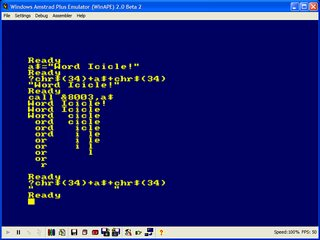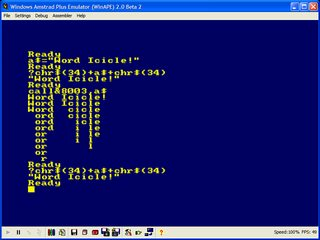45
5
Due to technical limitations of Stack Exchange, the title is rendered incorrectly. The correct title for this challenge is
Make a
Word Icicle!
Word Icicle
Word cicle
ord cicle
ord icle
ord i le
or i le
or i l
or l
or
r
Today's challenge is to make icicles out of the input word. Given a string of entirely printable ASCII, and at least 2 non-space characters, perform the following steps:
Print the current state of the string.
Replace the lexically smallest character (other than spaces) with a space. If there is a tie, replace the leftmost character.
Repeat on consecutive lines until the string contains only 1 non-space character.
This creates the effect that the input string looks like it's melting...
I'm Melting!!!
I'm Melting !!
I'm Melting !
I'm Melting
I m Melting
m Melting
m elting
m lting
m ltin
m lt n
m t n
t n
t
Rules
After a couple iterations, your output will almost surely have trailing spaces on each line. If you choose to truncate these, that is allowed.
You may have one trailing empty line, but not more.
Remember that the input may contain several spaces, but these are all effectively skipped. For example, the input
a ashould givea a aYou may take input as a list of strings if you want. For output, you may return or print a list of strings, a single string with newlines, or char matrix/2D array. Generally, I prefer permissive IO formats, so other formats are most likely allowed as long as they are consistent and clearly correspond to the right output. If in doubt, feel free to ask. As usual, full programs or functions are allowed.
Remember, this is a contest to make the shortest answer in any language! If you choose to answer in Java, try to make the shortest Java answer (in bytes) that you can.
Test cases
Hello World! -->
Hello World!
Hello World
ello World
ello orld
ello orl
llo orl
lo orl
o orl
o or
or
r
AbCdEfGhIjKlMnOpQrStUvWxYz -->
AbCdEfGhIjKlMnOpQrStUvWxYz
bCdEfGhIjKlMnOpQrStUvWxYz
b dEfGhIjKlMnOpQrStUvWxYz
b d fGhIjKlMnOpQrStUvWxYz
b d f hIjKlMnOpQrStUvWxYz
b d f h jKlMnOpQrStUvWxYz
b d f h j lMnOpQrStUvWxYz
b d f h j l nOpQrStUvWxYz
b d f h j l n pQrStUvWxYz
b d f h j l n p rStUvWxYz
b d f h j l n p r tUvWxYz
b d f h j l n p r t vWxYz
b d f h j l n p r t v xYz
b d f h j l n p r t v x z
d f h j l n p r t v x z
f h j l n p r t v x z
h j l n p r t v x z
j l n p r t v x z
l n p r t v x z
n p r t v x z
p r t v x z
r t v x z
t v x z
v x z
x z
z
PPCG is da BEST -->
PPCG is da BEST
PPCG is da EST
PP G is da EST
PP G is da ST
PP is da ST
P is da ST
is da ST
is da T
is da
is d
is
s
({({})({}[()])}{}) -->
({({})({}[()])}{})
{({})({}[()])}{})
{ {})({}[()])}{})
{ {}) {}[()])}{})
{ {}) {}[ )])}{})
{ {} {}[ )])}{})
{ {} {}[ ])}{})
{ {} {}[ ] }{})
{ {} {}[ ] }{}
{ {} {} ] }{}
{ {} {} }{}
{} {} }{}
} {} }{}
} } }{}
} } } }
} } }
} }
}


1"lexically smallest" means by code point? – Giuseppe – 2018-04-13T18:03:13.960
1@Giuseppe Yes, the character with the smallest ASCII code point (other than space obviously) – James – 2018-04-13T18:04:12.923
2Reminds me of another challenge where we had to, I think, vertically repeat a character by its index in the alphabet. – Shaggy – 2018-04-13T18:23:23.030
6
@Shaggy You're probably thinking of Make some Alphabet Rain.
– Rainbolt – 2018-04-13T20:11:58.780That's the very one, @Rainbolt. – Shaggy – 2018-04-13T20:14:23.257
Also somewhat related – FryAmTheEggman – 2018-04-14T04:33:28.030
2That reference to MediaWiki though... – Erik the Outgolfer – 2018-04-14T12:56:32.273
I am assuming it would be, but just to make sure: is an input string starting with a space valid? – Jonathan Frech – 2018-04-14T18:36:40.807
@Jonathan Yes, the input may contain leading/trailing spaces. – James – 2018-04-14T18:42:00.840
Kind of related – Esolanging Fruit – 2018-04-22T09:18:02.660